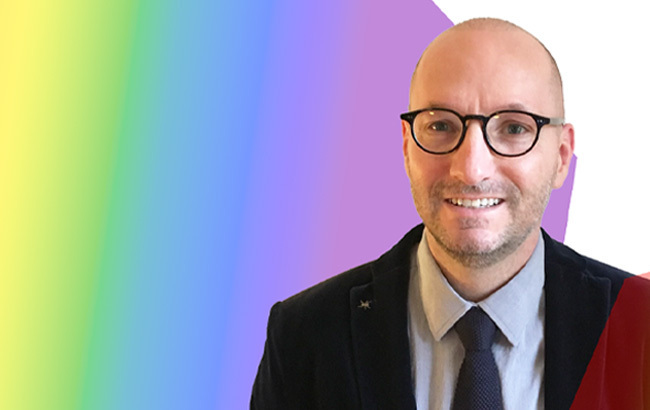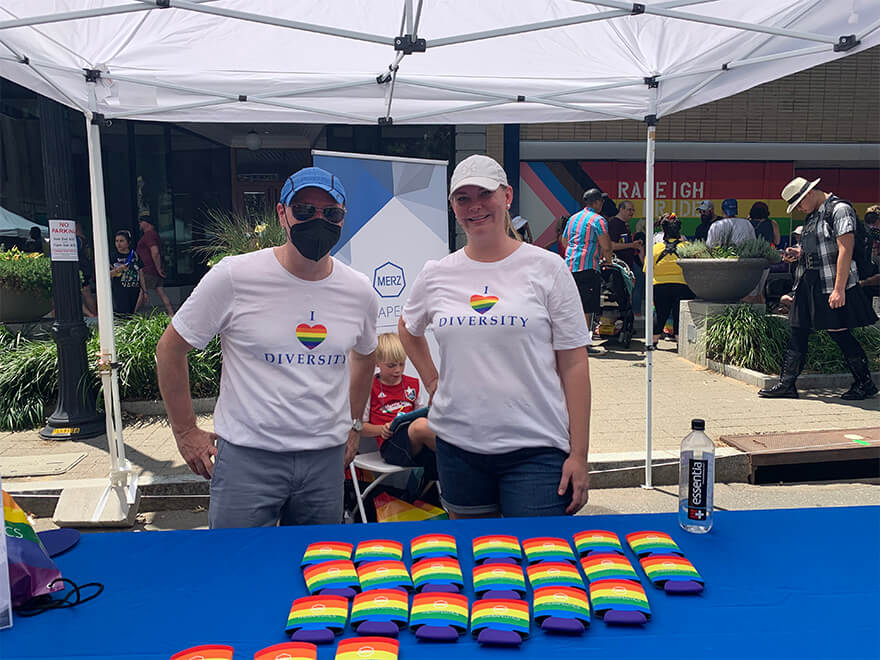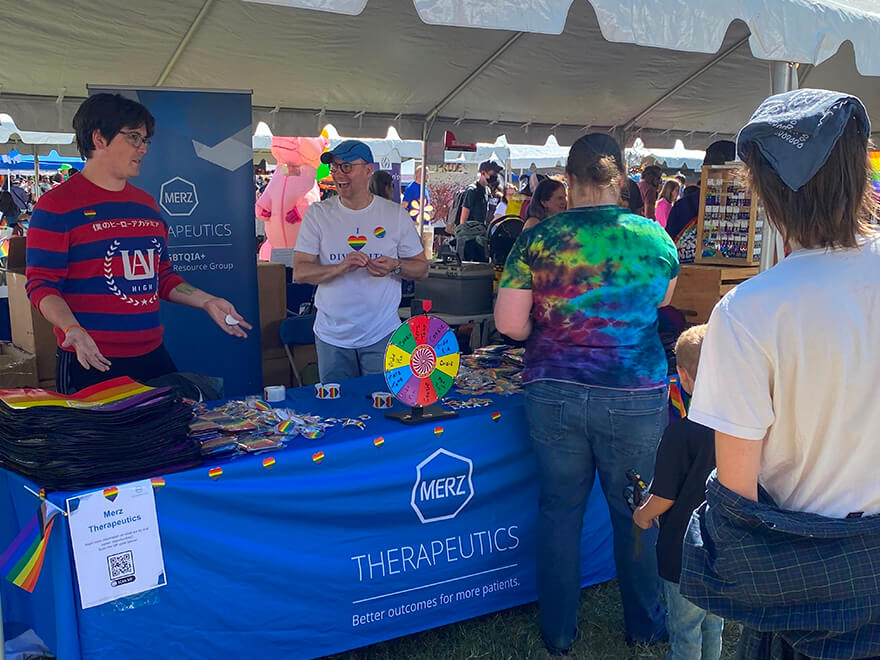Featured Content
Empowering LGBTQIA+ Voices: A Conversation with Kevin Walker
June 16, 2023

Interview with Kevin Walker, June 2023 – At Merz Therapeutics, diversity, equity, and inclusion are not just buzzwords but core values embraced wholeheartedly. As part of our commitment to fostering a truly inclusive workplace, Merz Therapeutics North America established Employee Resource Groups (ERGs) to empower employees and create spaces where they can champion important causes. One of these dynamic ERGs is the LGBTQIA+ Employee Advocacy Group, led by the passionate and dedicated employee Kevin Walker, Senior Manager for Drug Safety and Pharmacovigilance. With Pride Month underway, we sat down with Kevin to discuss the inception of the group, his personal journey, and the impactful initiatives they undertake to promote inclusivity, diversity, and equality within the company.
Kevin, can you tell us in short words, what is the LGBTQIA+ Employee Resource Group, and how did it come into existence?
Kevin: Merz Therapeutics has been working to address diversity, equity and inclusion over the last few years. Last year, Merz Therapeutics North America created a Diversity, Equity and Inclusion (DEI) Council. In June 2022, we launched our first inaugural ERG, our LGBTQIA+ ERG. We currently have three ERGs: our LGBTQIA+ ERG, a Multi-cultural ERG and a Women’s ERG. The DEI Council meets regularly, and the lead for each ERG attends these meetings. The council provides training materials and resources for our ERGs.
I am the lead for our LGBTQIA+ group since May 2022, and we have approximately eight to ten members who meet monthly. We are dedicated to fostering an inclusive workplace culture that supports the LGBTQIA+ employee base and community by providing resources for growth and development. We aim to give a sense of belonging and connectedness.
What motivated you to become involved and take on a leadership role in the LGBTQIA+ ERG?
Kevin: Diversity, equity and inclusion are something that has affected me all my life, both at a personal level and at a professional level. As a gay man, I have experienced challenges because of my sexual orientation. We all want to be treated fairly and valued for what we bring to the table.
I’m not proud of this but being gay was something that I hid until my early 30s. I have learned over time that life is a journey, and understanding and acceptance happens over time. Sometimes change happens with two steps forward and one step back, but it happens. I have learned that conversation is important because it helps break down misunderstandings and barriers and addresses biases, we may not even realize we have.

To be honest, being lead for the ERG was a little outside of my comfort zone, but I was motivated to take a leadership role in our LGBTQIA+ ERG because I thought I could contribute. For me, this felt like the right time to become involved. Maybe because I felt ‘safe’ at work and was thankful to be working at a company that recognized the importance of diversity, equity and inclusion and valued every employee. I thought that by sharing what I have learned from my past experiences and working with colleagues on initiatives to help bring us together, we could make a difference, both at work and in the community.
In your opinion, what are some of the most critical issues or barriers LGBTQIA+ employees still face today?
Kevin: I think it’s important to continue to address and understand our biases and look at unconscious biases as it relates to the LGBTQIA+ community and other marginalized groups. I feel that Merz recognizes giving all types of people an opportunity to contribute, regardless of race, color, religion, gender, orientation and more, is the right thing to do. Still, it also helps foster a sense of community so that we work better together and have a greater understanding of the daily challenges we all face. Recognizing diversity, equity, and inclusion makes us better as individuals, makes for a better and more rounded company and also makes us more competitive and stronger as a company.
How does the group engage with LGBTQIA+ employees to understand their needs and concerns? Are there any feedback mechanisms in place?
Kevin: Any employee is welcome to join our LGBTQIA+ ERG. We use internal communication channels to give employees the opportunity to become involved or join our group. Since our ERG inception, we have monthly meetings to address and discuss topics and issues affecting the LGBTQIA+ population, both at work and outside of work. To ensure we understand the needs and concerns of our LGBTQIA+ employees, we ask for input and feedback from our ERG members at our team meetings. Outside of meetings, we also send surveys to members to vote on discussion topics and initiatives to address.
What are the projects you are working on?
Kevin: This has been a “building year” for our ERG. Since our ERG start-up, we supported local Pride events, have held a Pride Month panel for all Merz Tx employees (editors note: in the US), visited conferences and organized many discussions. We are especially proud of our last hosted event with Matthew Shepard Foundation. Matthew Shepard was a 21-year-old gay male murdered in 1998 because he was gay. His death was considered a hate crime. Matthew Shepard’s parents were the guest speakers. They addressed the work their foundation has been doing since their son’s death, advocating on behalf of the LGBTQIA+ community and drawing attention to violence and discrimination experienced by the LGBTQ+ community.
In June 2023, Merz Therapeutics will be a sponsor at our local Pride event, the Out Raleigh Festival, and we will have a booth where both ERG and non-ERG members can attend and participate. In July 2023, some members of our ERG plan on attending the Diversity, Equity & Inclusivity Conference in Raleigh, presented by the Triangle DEI Alliance and the Raleigh Chamber. In the Fall of 2023, we will also attend and be a sponsor at the local Durham Pride event.

Have you encountered any challenges or resistance while leading the group? If so, how did you address or overcome them?
Kevin: I think the challenge for our ERG is that this is still relatively new to us, that we are all learning and still have lots to learn. Thus far, we have not encountered resistance. Our ERG is a safe space for everyone to connect, share ideas, celebrate our differences and diversity, and innovate. During our meetings, no one will be singled out or expected to represent a group or idea, and everyone can participate at their own comfort level.
How do you envision the future of LGBTQIA+ inclusion within Merz Tx, and what are the group’s long-term goals?
Kevin: Our LGBTQIA+ ERG shares and aligns with the DEI strategic goals of the organization. We aim to bolster a diverse and inclusive company culture, attract, develop and retain a diverse and equitable workforce, increase the representation of women and underrepresented groups in leadership and cultivate an inclusive culture with equitable policies and processes.
I believe DEI is no longer a nice thing to have but is essential. As DEI members, we serve as change champions for our employees and help to drive the success of the business.
In your opinion, what is the significance of Pride Month in the workplace, and how can we ensure that the celebration of Pride Month leads to tangible support and inclusion for LGBTQIA+ employees?
Kevin: Celebrating Pride Month in the workplace reinforces that a company values everyone, regardless of who you are. It shows that the company celebrates and values diversity within the company. I believe that this does foster a more positive work environment.
Pride month to me is symbolic of being able to live your life in the open, without fear, but also accepting and celebrating our differences. We are all not alike, and that is a good thing! I fully recognize that I have benefited from all the work done by people before me who have fought the good fight for equal rights for the LGBTQIA+ community. I do think symbolic gestures are meaningful, but more important is tangible support, which can include being an ally to those in need, not just in our community but any marginalized community. I also believe the importance of representation or having a “seat at the table” cannot be understated, both at and outside of work.